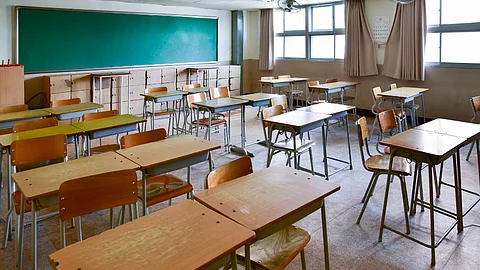

The Union Ministry of Education has set up an 11-member panel to look into growing concerns about the rising dependence of students on coaching centres. The panel, chaired by Vineet Joshi, Secretary for Higher Education, will examine the coaching centre ecosystem and suggest measures to minimise the students’ growing reliance on these centres, which promise a thriving higher education.
The other members on the panel include Rahul Singh, Chairman of the Central Board of Secondary Education (CBSE), joint secretaries from various departments of school and higher education, representatives from three Indian Institutes of Technology (IITs) Madras, Trichy, and Kanpur, and the National Council of Educational Research and Training (NCERT). Additionally, the panel will have three nominated principals, one each from Kendriya Vidyalaya (KVs), Navodaya Vidyalaya (NVs), and a private school, reported Business Standard.
The panel is intended to deliberate on the reasons behind booming dummy schools and their role in promoting full-time coaching at the expense of formal schooling. The panel will address this looming issue by suggesting ways to mitigate it.
This followed after the Central Board of Secondary Education (CBSE), in March 2025, restricted students enrolled in such dummy schools from giving Class 12 examinations. Dummy schools are referred to institutions where students are formally registered but are not obligated to attend daily classes.
These schools primarily cater to students preparing for competitive entrance exams, such as the Joint Entrance Examination (JEE) for engineering and the National Eligibility-cum-Entrance Test (NEET) for medical admissions.
Describing the initiative as a timely and necessary step towards redefining education in India, Dr Ameeta Mulla Wattal, Chairperson and Executive Director for Education, Innovations, and Training at DLF Foundation Schools and Scholarship Programmes, said that the move aims to restore the relevance of the school system, especially at the senior secondary level, which the growing prevalence of dummy schools has undermined.
The committee will examine gaps in the current school education system, including the lack of emphasis on critical thinking and reasoning skills, as well as the prevalence of rote-based learning.
Dr Wattal emphasised the need to address the disconnect between school curricula and coaching centre content, pointing out that an exam-driven, rote-based approach may hinder students from gaining deep academic understanding.
The Joshi Committee will examine how fair and effective competitive exams are in the context of school education, and how they have contributed to the rise of the coaching industry.
It will also evaluate how well students and parents understand different career options and the availability of career counselling.
The panel is expected to review promotional practices, including misleading advertisements and the highlighting of selective success stories, and suggest steps to curb such trends.
This follows last year’s guidelines issued by the Central Consumer Protection Authority (CCPA) to curb misleading advertisements in the coaching sector, amid rising concerns over inflated success claims, deceptive promotions, and unfair contractual practices.
